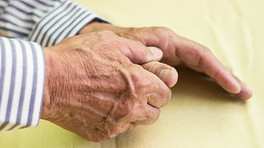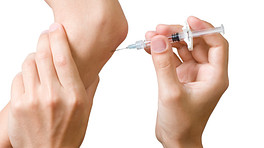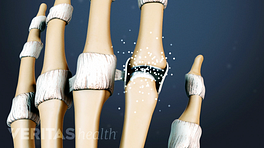My name is Sierra, I am 26 years old, and I was diagnosed with RA at 14 months. My knee was the size of a softball. We lived in kind of a small town in northern Michigan. So they went in, the doctor just didn't really know. I mean, it's not very common for a little baby to have rheumatoid arthritis. So they drained my knee and kind of sent me home, on my way, without a diagnosis. And then, about a month later, my knee was the same size. My mother and grandmother took me down to Ann Arbor, to the University of Michigan, and I walked in, and they diagnosed me on the spot.
My understanding of RA as a child was swollen knees, some warmth, and some redness. As a child I was fortunate enough to only have it in my knees. It was usually one knee or the other, primarily my left. That's the one that I had surgery on as an infant.
Going through puberty and high school and college, like it really, with all those emotions, you're just kind of like, "Well, I can't do this because of this!" you know? I eventually come out of it. I consider myself to be a very strong person, and I think that without that, the RA would have affected my life for sure.
I went through many times throughout my teenage years, to even current day, where I just get "Woe is me," or, I just, "I'm not dealing with this right now." But the fact of the matter is I do. And I eventually just kind of come out of my "Woe is me" after a few days and just say, "Suck it up! Like, this is your life and it's OK."
As an adult, my symptoms primarily are in my ankles, my toes, my hands, my wrists, and my knees. Pretty much everywhere.
I'm an assistant director at an early childhood center, and that actually plays into my treatment plan as well. If I'm immunosuppressed and I'm in a center with 70 children, I get, like, I've been sick for the last month and a half. And, when you get sick, you get sick faster, you get sick harder, and you get sick longer.
When people find out I have RA, being as young as I am, I get a lot of, "Oh, you poor thing. Oh, you poor this." And, I don't want people's sympathy. I don't—people apologizing to me for my RA is like apologizing for how I became me. I've had it my whole life. It's taught me strength. It's taught me independence. It's taught me perseverance. It's so much a part of who I am that I don't think it's fair for people to apologize to me or to feel sympathetic for me. I would much rather people say, "You're so strong," and just recognize that and appreciate it, so that I could just say, "Thanks!" And we can go about our day.
I chose an IV biologic because I had done the injections and I just couldn't do it. I mean, it's not that bad. It's not that difficult. But I feel like IV biologics holds me a little bit more accountable. I actually have to show up somewhere and I'm on somebody else's schedule, so that I'm less likely, in my world, to take myself off of the drug.
The first time I got an infusion, it was a little scary. It was hard, like, you're just kind of in a room with other people you don't really know. There's nurses that are pretty much the same people every time you go, but you don't really know what to say to them or if you're supposed to talk to them. It's scary. It's overwhelming. It's hard. The more you go, the more you just kind of—the nurses are great. They know you by name, they know your information, they know kind of where you're at. So just kind of talking to them and reading books and making sure that I just stick with it, I think, helps make it less scary.
I love my rheumatologist. She is the best one I've had. I now see Dr. Capezio and I adore her. She just—she takes so much time to work with me and figure out exactly the kind of medication that I need to be on. And she never makes me feel guilty for, like, not wanting to be on it. Every time I go in there and I'm just like, "I took myself off my Enbrel" or my prednisone, or whatever it may be, she's like, "OK. How are you feeling? What do you want to do? Was it not working?" You know? So she's just really good about working with me and figuring out a program that's going to work with me in the sense of my day-to-day life, in the sense of my family planning life, and in the sense of my future.
Finding the right rheumatologist can be hard. Don't give up. There's tons of good doctors out there. I was fortunate to find one at a young age, but I also found her after, like, 20 years after I was diagnosed. So it takes time. But just find somebody that you can talk to and that you don't feel guilty saying, "I don't want to be on this medication." Somebody that's willing to educate you and take time with you and really try to figure out what's going to work best for you.
Advice for loved ones: Patience, love, and care. You don't always know what's going on. You can't always see what's going on. And it's really, really hard for somebody to feel like a burden. I recommend just being there, listening, showing an interest. You don't always understand what's going on. I've had it for 26 years and I probably have understood it for about two. Your life changes a lot, so just being able to have somebody there to talk to and have somebody there that genuinely cares and wants to know more to help you is the best thing. Staying strong for them and for yourself is probably the best advice I can give.
In This Article:
- Juvenile Idiopathic Arthritis and Other Rheumatologic Diseases in Children
- Symptoms and Causes of Juvenile Rheumatologic Diseases
- Diagnosing and Treating Rheumatologic Conditions in Children
- Rheumatoid Arthritis Patient Story: Meet Sierra










